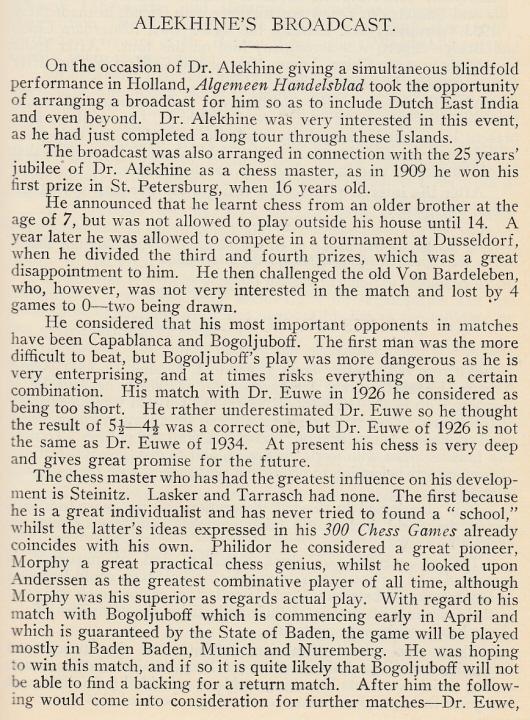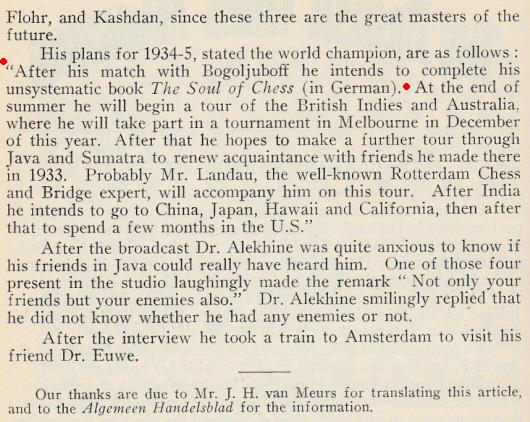

Edward Winter
Concerning the famous Philidor remark, see Philidor: ‘Pawns are the soul of chess’. The present article discusses other occurrences of the term ‘soul of chess’ in chess literature.
***
A quote vaguely ascribed to Alekhine (e.g. on the Internet) is ‘combination is the soul of chess’. Whether he ever made such a remark we cannot say, but certainly he stated (in November 1934, in his Introduction to La Défense du Fianchetto de la Dame by V. Kahn) that the centre is the soul of chess.
Alekhine wrote that Philidor’s observation about pawns being the soul of chess was both right and wrong and that it needed to be understood as meaning ‘Les pions, comme facteur de domination du centre, sont l’âme des échecs’. Philidor, added Alekhine, instinctively realized the importance of the centre but erred in believing that it needed to be dominated by pawns, a pardonable mistake also made by theoreticians (‘including the dogmatic Tarrasch’) for a century and a half. It was not, Alekhine said, until shortly before 1914 that Nimzowitsch, among other young players, began affirming that the centre could be controlled by pieces, even from afar, a paradox at the time but now accepted as true. Kahn’s book, concluded Alekhine, did not refute Philidor’s principle but was most successful in complementing it. (‘Son étude ne réfute pas le principe de Philidor, elle le complète de la plus heureuse façon. C’est le centre qui est l’âme des échecs.’)
(3977)
We have now found the following on page 29 of Das Internationale Schachmeisterturnier in Budapest 1896 by G. Maróczy (Kecskemét, 1941):
‘Kombination ist die Seele des Spieles.’
This remark appeared at the end of the annotations to Tarrasch v Albin, and the book’s introduction (pages 6-7) indicates that those notes were written by Charousek. Further information is being sought.
(4074)
From page 18 of Banks’ Blindfold Checker Masterpieces by Newell W. Banks (Philadelphia, 1947):
‘ ... the fact remains that compared with checkers very few chess encounters are drawn, due mainly to the tremendous scope of the middlegame, which has been aptly termed “The soul of chess” ...’
(4550)
What is the soul of chess? Among the possibilities are pawns (Philidor), combination (Maróczy), the centre (Alekhine) and tempo (Tarrasch). We now add the following:
Source: The Major Tactics of Chess by Franklin K. Young (Boston, 1909), page 269.
Source: The Joys of Chess by Fred Reinfeld (New York, 1961), page 117.
Source: Chess Players’ Thinking by Pertti Saariluoma (London, 1995), page 153.
(6130)
The Tarrasch quote ‘Tempo is the soul of chess’ was given on page 387 of Kings, Commoners and Chess from page 56 of Tarrasch’s Schachzeitung, 15 November 1933. The original German:
‘Wie ich schon öfters erklärt habe: das Tempo ist die Seele des Schachspiels.’
Further to C.N. 3038 (see page 325 of Chess Facts and Fables), we still hope to find corroboration of a quote included by Vera Menchik at the start of an article, ‘How to Meet an Attack’, on pages 479-482 of the Social Chess Quarterly, January 1935:
‘“Counter-attack is the soul of the game”, said Blackburne, and all the authorities agree that counter-attack is the best possible defence.’
Vera Menchik further endorsed the sentiments in the final paragraph of her article:
‘And so once more we repeat: counter-attack is the soul of the game, and it is the best possible defence ...’
(8218)
From pages 97-98 of the March 1934 BCM:


A small correction was published on page 181 of the April 1934 issue:

Regarding the ‘unsystematic book The Soul of Chess (in German)’ referred to in the BCM report, on pages 5-6 of Alekhine Nazi Articles (Olomouc, 2002) K. Whyld speculated that, although no such book ever appeared, ‘perhaps some of the ideas that were in Alekhine’s mind at that time appeared in the PZ [Pariser Zeitung] series.’
(8868)
Some additional quotes:
Source: Bell’s Life in London and Sporting Chronicle, 22 November 1835, page 3.
Source: Bell’s Life in London and Sporting Chronicle, 21 May 1840, page 4.
Source: Bell’s Life in London and Sporting Chronicle, 24 December 1843, page 2.
Source: Bell’s Life in London and Sporting Chronicle, 20 January 1872, page 2.
Wolfgang Heidenfeld’s entry on aphorisms on page 16 of The Encyclopedia of Chess by Harry Golombek (London, 1977) included the following:
‘“Exchanging is the soul of chess” (Kieninger).’
No source was supplied, and the observation has also been given without further particulars in the entries on Georg Kieninger in a number of German chess encyclopaedias:
Sources: Großes Schach Lexikon by Klaus Lindörfer (various editions as from 1977, page 138) and Das rororo Schachbuch von A-Z by Klaus Lindörfer (Hamburg, 1984), page 138.
Source: Lexikon für Schach Freunde edited by Manfred van Fondern (Lucerne and Frankfurt/M., 1980), page 153.
Source: Meyers Schach Lexikon edited by Otto Borik (Mannheim, Leipzig, Vienna and Zurich, 1993), page 150.
(8869)
From page 303 of The Fireside Book of Chess by I. Chernev and F. Reinfeld (New York, 1949):
‘Attack, to paraphrase the great Philidor’s maxim, is the soul of chess.’
An 1889 note by Pollock on page 333 of W.H.K. Pollock. A Chess Biography with 523 Games by Olimpiu G. Urcan and John S. Hilbert (Jefferson, 2017):
‘We base this form of development on the principle that “counter-attack is the soul of defence”, v. Anderssen vs. Morphy, games II and IV of match.’
(10484)
To the Chess Notes main page.
To the Archives for other feature articles.
Copyright: Edward Winter. All rights reserved.